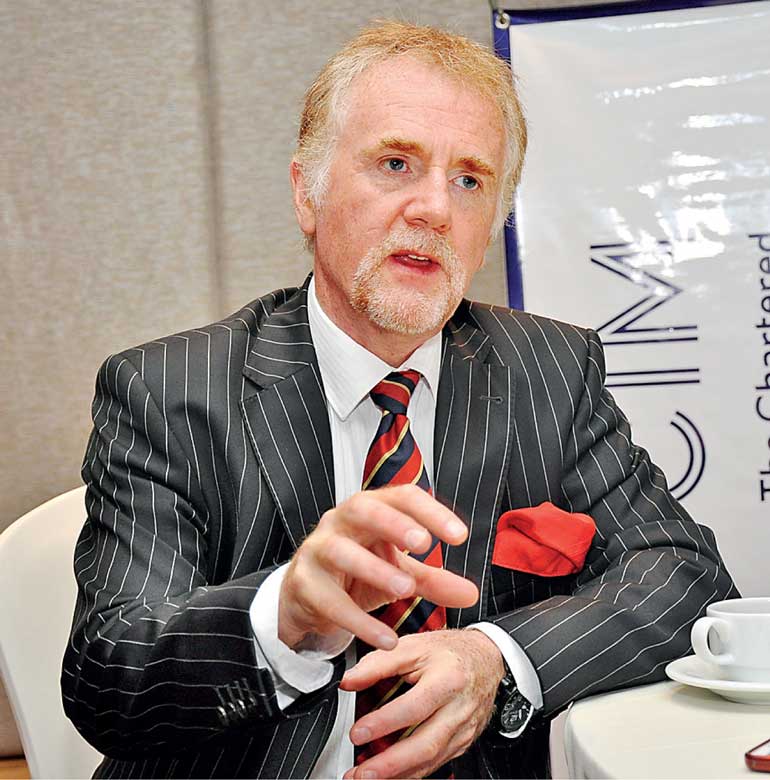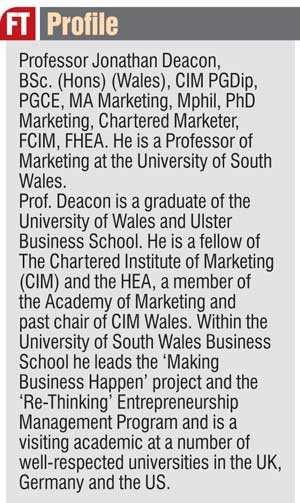Friday Feb 20, 2026
Friday Feb 20, 2026
Wednesday, 10 August 2016 00:02 - - {{hitsCtrl.values.hits}}


By Charumini de Silva
The Chartered Institute of Marketing (CIM) Vice Chair Professor Jonathan Deacon was in Sri Lanka recently to attend CIM Sri Lanka 2015 Graduation Ceremony as the Chief Guest.
He was highly impressed with the progress of CIM Sri Lanka Region and found that Sri Lankan members are passionate advocates of CIM in particular and professional marketing in general.
During his visit Prof. Deacon met CIM members and key officials to discuss and explore the possibilities of CIM’s contribution towards education and professional development in Sri Lanka.
Although Prof. Deacon calls himself an academic person, he has had a life before academia. Having founded his first company at 17 he has the experience of running and advising businesses from micro-business start-up through to corporate and public sector bodies with multi-million pound budgets; he retains an interest in a number of successful Welsh knowledge based companies.
During his short visit Prof. Deacon spoke to the Daily FT about the recent developments in CIM, the marketing profession and the function.
Following are excerpts:
Q: What is your opinion about Sri Lanka?
A: This is my first time here. I have loved it so far but I have not seen much of it as the CIM officials here are keeping me quite busy. However, I am already planning to come again for a vacation.
Q: How successful has the CIM Sri Lanka office been so far?
A: Sri Lanka is our largest membership group out of the UK. I think we in the UK can learn a lot from Sri Lanka in terms of how CIM Sri Lanka works with our volunteers. CIM Sri Lanka has a huge value and in my view that is being a member of the CIM professional body is also about building networks and friendships. The office has identified the critical factor of those emotional ties, which are really important in

business today. It is about knowing people, knowing something about people, knowing why those people behave in a certain way or say the way they do.
Therefore, being a part of a professional body where friendship is encouraged I think it makes a great force to reckon within the business community. CIM Sri Lanka is really important to us and we like what they do. Events like this for instance bring in people really important. It says that marketing is not just a department, but it is ‘the department’ that can make things happen.
Sri Lankan CIM members are the most passionate, well educated, professional marketers that I have come across. I’m a Welshman and I think back in Wales we can do a lot better and learn a lot from Sri Lanka. One thing I noticed is that when Sri Lankan CIM members come into the Board Meetings in the UK they always brings a gift with them – it is just a small thing, but it means so much. That’s a warm and lovely thought behind it which attracts the mind space of a person, which is critical in today’s world.
Q: What is the key challenge marketer’s face globally?
A: The big one we all think about is the concept of ‘change’ and how we manage that change. Change is inevitable, but change is also very fast which kind of suggests that we as marketers have a really good opportunity and a duty as businesses are moving forward at a rapid pace. One of the things we can do is to identify where the change is most likely to come from. I think that whole management of change is not about how we manage the change, but where the consumer is going and understanding what is trending at the moment.
Thereafter it is up to the marketers to articulate that into organisations. Second fact is how we marketers integrate within organisations. I think we have come from a recent past where we may have seen ourselves as softer elements such as sales and advertising. We as marketers need to illustrate that we can also do harder things such as return on investments, return on ideas and management of people. We need to emphasise that without marketers the organisation does not go anywhere.
Marketers are the business development part of the organisation. It is imperative to blend that very difficult interface of entrepreneurial marketing, creativity and financial management together. We have to do many things as marketers. Since the financial crash in 2008 we have seen organisations looking closely at their financial activities and management as a critical aspect. Hence as marketers we need to show that we have a duty to care both within and outside.
I think internally we need to reassert why professional marketing is important to an organisation because we are not just there to do the pretty things but to do the hard things as well.
Q: Do you think the organisations in today’s world have recognised the marketer’s role the same way you explained above?
A: I think some companies are being seduced by the technology and have not made use of their marketer’s real potential. Therefore, it is important to re-establish the fact in a much more central way to the organisation. However, the successful smarter companies have recognised the unique blend of marketing, entrepreneurship and hard financial understanding. As a professional body that is where we are focusing our attention to convey it to the corporate world. Once you have a professional marketer within your organisation, you’re organisation is fit for purpose, it kind of looks forward for the future.
Q: From a global perspective, what are the emerging marketing trends?
A: I think over the last few years we have seen a shift towards an idea of ‘Prosumers’ – consumers who are not only consuming, but they are creating their own version of products or services. The key reason for it was because organisations were not supplying what the customer wants, so it is imparted. This is because there is not enough close relationship between the consumer and the supplier and also because the technology now allows to prosume better.
Especially in the UK look around our houses, kitchen equipments for instance, many kitchens are well equipped as any professional kitchen. Thereby, people are not going out in the evening to eat, instead they are dining at home and becoming prosumers. People who loved baking started to bake cakes and slowly started to bake cakes for friends, family and cater to small events eventually turned from just being a consumer to being a prosumer. It is a big trend at present.
Q: What advice would you give for an organisation that spurs growth around value generation and entrepreneurial marketing?
A: There are two scarce resources in today’s world. One is mind space and the other is creativity. In today’s world we tend to have so many in our heads, but as marketers we need to help our organisation establish themselves in the minds of the market. As mentioned before, change is taking place in an accelerated pace where it is critically important to understand how we as marketers are going to manage that situation in the commercial world. It is how we are going to be creative and equip our organisations to look at creative solutions to existing problems.
The entrepreneurial marketing comes in handy here as they tend to proactively identify and deliver creative solutions. In my view entrepreneurship is a part of marketing, but we have forgotten a little bit of it that we are the creative agents within the organisations. These are the areas we need to emphasise to organisations that the marketers are not just creative in art, but in providing business solution as well.
Q: What is your opinion about the marketing practice and talent in Sri Lanka?
A: CIM qualification equips a person to qualify a person for future marketing wherever they are. We all are still students of business because the world is changing and we have to be aware of that. I think what is really good about our qualification is that it helps people to continually think improving their profession. In terms of Sri Lanka, I think the country has some brilliant marketers. It often amazes me how many people qualify here in Sri Lanka with this globally recognised professional qualification.
I think that is one way very exciting and slightly scary. Exciting because there is war for talent globally – young, really clever, smart people. Scary bit is that Sri Lanka produces really top quality global marketers. I’m a Welshman, my students in Wales have a real good talent to compete with the kind of marketers that Sri Lanka is producing but in the meantime I’m an old guy. Generally, the global youth just look at the world in a very different way than how I used to think when I was in their age.
However, the talent in Sri Lanka is a testament to the culture as well that really celebrates academic achievement and recognises it. I think any society that recognises academic achievement is going to succeed because without education we are like empty vessels. It is warming to see such talent from Sri Lanka and it’s an advantage for the country in going forward to have an educated workforce that is able to operate internationally.